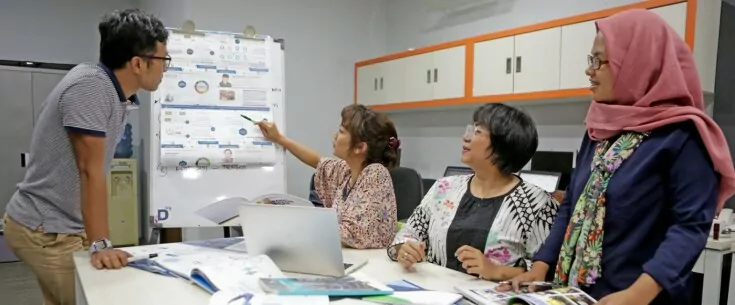MDIF Media Fund I (MMF I) provides an alternative to capital that seeks to distort or influence editorial independence, whether for political or commercial reasons. Operating in countries where access to free and independent media is under threat and little, if any, financing is available without strings attached, its affordable loans allow independent media to invest in systems and technologies so they can grow audiences and revenues and compete with government-aligned outlets.
MMF I clients provide news and information that is critical to open societies. They hold governments to account, expose corruption and provide people with the information they need to make informed decisions about their lives. They enable progress on societal issues – like the environment, LGBTQ+ and gender – help ensure free and fair elections and provide people with a platform for debate. They also provide reliable health information and counter misinformation.
Clients range from companies producing investigative TV programming to general news sites in countries like India, Ecuador and Malawi, and from media serving small local communities to national sites with millions of users. Whatever their size and platform, MMF I clients have a real impact on their cities, regions and countries. Here are some examples of the work they are doing and the impact it is having.
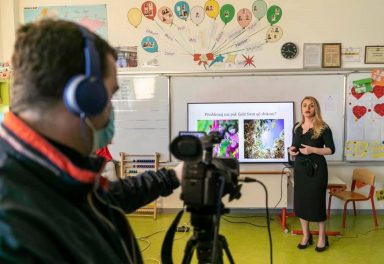
Combatting COVID-19
In many countries, the destruction caused by the pandemic has been amplified by a lack of reliable information. MMF I clients have worked hard to provide their audiences with timely health news and advice and connect them to their communities in meaningful ways.
When the first case of COVID-19 in Ecuador was confirmed in early March, digital news and information site GK launched a page that gathered all the most recent news, reports and data on the subject. GK also analysed the crisis from different perspectives, showing how in addition to being a significant threat to public health, COVID-19 also affects human rights, contextualizing the pandemic’s disproportionate impact on children and women. And with Ecuador’s death toll being among the worst in the world, GK helped people who were unable to attend funerals by creating a space for online tributes to those who had died, enabling communities and families to pay their respects publicly to their loved ones.
The health implications of the pandemic are of course only part of the story, with lockdown causing huge financial and personal hardships for many, particularly groups that were already vulnerable. In India, when a sudden lockdown was announced, millions of migrant workers were stranded in cities or forced to walk or bike hundreds of kilometres to their hometowns, sometimes with very little food. Digital media company Scroll highlighted the plight of migrant workers across the country, for example reporting on a large group housed in an inadequate temporary shelter in New Delhi that was so unsuitable it was set on fire by residents in desperation at their predicament. The story pushed the local authorities into moving the workers to more suitable alternative accommodation. Scroll then extended the story beyond the immediate impact of the pandemic and used it as an entry point to discuss longer-term issues facing migrant workers.
The unequal impact of the pandemic was also highlighted by magazine and online news site El Buho in Peru, where a shortage of Intensive Care Unit (ICU) beds in public hospitals forces many to resort to private clinics. El Búho investigated the high costs private treatment, revealing that a person earning the national minimum wage would need to work for nine uninterrupted years and dedicate their entire salary to pay off the debt of $27,500 for spending just one week in an ICU in a private clinic. El Buho highlighted the human cost by telling the story of Ricardo, who admitted his 72-year-old mother to a private clinic with COVID-19 and who, after his mother died, faced financial ruin.
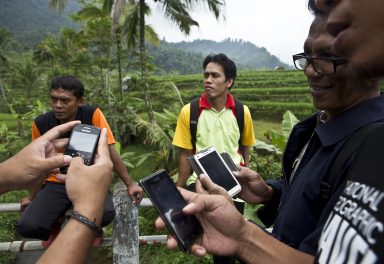
Protecting the environment
Highlighting the impact of climate change, both the damage it causes to the environment at a macro-level and to individuals’ lives, is important in raising awareness and changing people’s behaviour.
Forest fires cause high levels of air pollution in many parts of Indonesia, leading to serious health problems for hundreds of thousands of people. In 2019 the fires, set mostly to clear land for planting on the islands of Sumatra and Borneo, generated a toxic haze that spread as far as Malaysia and Singapore and caused damage of at least US$5bn. In a long-form, multimedia, data-driven piece, Jakarta-based digital company Katadata investigated the macro drivers of the haze and analysed government efforts to tackle the crisis, emphasising the importance of preventive measures.
At the local level, in Ukraine Molodoy Bukowinetz newspaper reported on an illegal sand-mining operation on the banks of the river Dniester. The mining not only destroyed the riverbank and surrounding wildlife, but also posed serious safety hazards to illegal diggers, with the daily reporting on two related deaths. After publication, the authorities ordered the closure of the mine – the entrance was blocked and a police post was temporarily established to prevent the area from further exploitation.
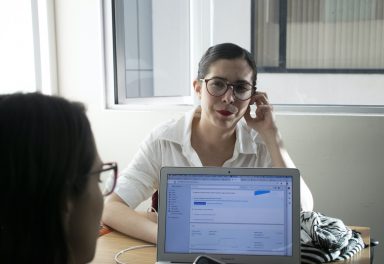
Supporting women’s rights
Exposing abuse by men in positions of power is even more difficult, but potentially more impactful, in societies where the balance of power is most unequal. In 2019, Indian news portal Scroll published an article in which a former Supreme Court employee accused one of the serving Chief Justices of India of unwanted sexual advances. The report also reported that the accuser and several of her family members had been suspended from their public sector jobs. A Supreme Court committee quickly cleared the Chief Justice of wrongdoing but coverage of the case prompted civil society groups, lawyers and activists to join the victim in demanding a new and impartial probe. Soon after, without any explanation, the accuser and her family members were reinstated to their jobs.
With unemployment high and wages low in Lesotho, migration continues to be a dominant livelihood strategy for many households, with growing numbers of women seeking work abroad. Often employed as domestic workers in South Africa, many suffer discrimination, low pay, poor working conditions and inaccessibility to healthcare. The weekly Public Eye has shone a light on this controversial issue, for example publishing “Unskilled domestic workers suffer in silence”, the personal story of one domestic worker, an investigation into the challenges migrant workers face and a call for change.
While reporting abuses is essential in combatting discrimination, there are other ways that media can help address systemic gender imbalance. For example, men are used as expert sources much more often than women, which reinforces perceptions of knowledge and power. To help address the under-representation of women in the media in Latin America – where only 27% of news sources consulted by journalists are women – Ecuador’s GK launched “Voces expertas” (“Expert Voices”), a Latin American directory of women experts in different fields. The guide was created to give journalists easy access to diverse sources on various topics and to empower women specialists and make them more visible.
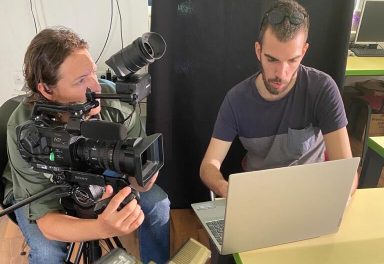
Exposing corruption
Exposing corruption is one of the key watchdog roles of the press and underpins all fair and transparent societies. In Botswana, Sunday Standard carried out a long investigation into the misappropriation of $24 million from the National Petroleum Fund by the Directorate of Intelligence and Security (DIS). The money had initially been requested by the head of DIS to build fuel containers for security agencies but was illegally diverted to Israel to pay for military equipment. Sunday Standard discovered a paper trail showing a sequence of suspicious transactions and a web of interconnected companies with cross shareholdings. The Directorate on Corruption and Economic Crime launched an investigation into the money laundering scheme, while the head of DIS was dismissed by the President.
Serbia’s Insajder revealed that the contract for reconstructing a former Belgrade central railway station was awarded privately, without issuing a call for proposals. According to the contract, the works were worth EUR2 million. Insajder revealed that the authorities deliberately avoided public tender, which would have entailed meeting certain criteria and achieving the best price through bidding. The exposure led to a reexamination of the allocation.
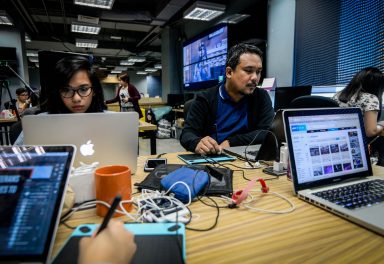
Countering misinformation
Sometimes providing reliable information is not enough. In some countries, misinformation is used as a tool to bolster authoritarian governments and undermine the democratic process. In the Philippines, Rappler has been at the forefront of holding President Rodrigo Duterte to account and exposing the misinformation promoted by his administration. The outlet analysed data on content posted on Facebook and found that the official pages of the Philippines police routinely published disinformation and amplified fake news and hate-speech in a way that suggested coordination with the content creators. After reporting their findings to Facebook, the social media platform took down two networks, one based in China and one in the Philippines. Rappler followed up by exposing the people behind the pages and their links to the military and police.
In Ukraine, a series of investigations into the Telegram messaging app by Liga showed how some domestic channels were systematically amplifying posts by channels affiliated with the Kremlin. They also showed how easy it is to create an influential and misleading anonymous channel. Liga set up a Telegram channel dedicated to the flat Earth “theory”, spending only $200 and less than an hour on the experiment and attracting 20,000 readers and 25,000 post views.

Supporting fair elections
Independent media are essential to fair elections, for example by providing information on candidates from all sides so citizens can make informed choices and by monitoring the election process.
In spite of its deep poverty, Malawi was voted as The Economist’s country of the year in 2020 for its peaceful transition of power, despite disputed elections. In June, the leader of the opposition won a rerun presidential election after the country’s Constitutional Court nullified the results from May 2019 polls, which gave victory to the incumbent. All parties accepted the Court’s ruling and the second election results in part due to responsible coverage by the media, including the country’s leading radio station, Capital Radio, whose journalists provided balanced information pre- and post-election and live coverage from voting centres to help ensure a fair process.
In June 2020, Serbia held parliamentary elections amid concerns over the pandemic. With much of the opposition boycotting elections, President Aleksandar Vucic and his right-wing party won a comfortable victory. The OSCE criticised the lack of media diversity and the ruling party’s control of major outlets. However, Insajder provided an alternative to the partisan content on offer elsewhere. It offered space for open debate, hosting representatives of different parties in its “Insajder debata” show, scrutinising irregularities at polling stations and providing balanced coverage throughout.
In preparation for India’s general elections in April-May 2019 and to reflect on the previous five years, Scroll launched “The Modi Years”, a series of informationally rich and rigorously researched articles on the performance of the Indian government under the leadership of Prime Minister Modi. This accountability and fact-checking project revisited the key milestones and initiatives of the Modi government and examined its impact on India’s national life.
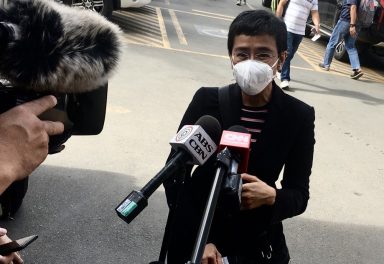
Blaming the messenger
Reporting on social issues, particularly holding authorities to account and exposing wrongdoing, can come at great personal cost. Many journalists and editors working for MMF I clients have been subjected to harassment. For example, in June 2020, police in Varanasi opened an investigation into Supriya Sharma, executive editor of Scroll, for alleged defamation and negligence that could spread the coronavirus. The investigation was sparked by an article by Sharma, which alleged that residents of a village in Varanasi, Prime Minister Narendra Modi’s parliamentary constituency, had gone hungry during lockdown. If convicted, Sharma could face a fine and up to two years in prison.
In the Philippines, Maria Ressa, Rappler’s founder / CEO, is facing a barrage of lawsuits as part of a systematic campaign of intimidation by President Duterte. In addition to spurious cyberlibel charges, she is also facing another libel prosecution, two criminal cases alleging illegal foreign ownership in her companies, and investigations into her tax returns. If convicted of all the charges, Ressa could face almost 100 years in prison.
Ressa is a Time magazine Person of the Year and one of the best-known names in press freedom globally. Yet this status offers no protection – the authorities still try to silence her. What better testament to the importance of independent media?
